Paul Levinson's Blog: Levinson at Large, page 203
December 8, 2017
Knightfall 1.1: Possibilites
 Knightfall debuted on the History Channel this week, right after its excellent and enormously successful Vikings. The new series has possibilities.
Knightfall debuted on the History Channel this week, right after its excellent and enormously successful Vikings. The new series has possibilities.It focuses on a group in a period of time not often (if ever) seen on television, the Knights Templar in their period of decline, after their losses in the Holy Land, headquartered in France, with a soon-to-be-hostile king. They're in decline, but still powerful, and reminiscent of the Jedi in Star Wars, fighting a losing battle (at least in the first two trilogies) against the burgeoning empire. This of course is no coincidence, given that George Lucas modeled his Jedi after the Knights Templar, among other groups.
In the first episode of Knightfall, we see the Templars coming to the aid of the downtrodden, which at this point include the poor and Jews who are being forced to leave their home by the French King, ostensibly to "protect" them for the virulent anti-semitism in his kingdom. The knights are great fighters, savvy, and in some cases lusty, including one of their leaders have a passionate affair with the Queen. That, presumably, will be at least one of the reasons he'll turn against them.
In our own history, the Knights Templar were an important group, transcending their time with innovations in everything ranging from banking to societies that pull the strings above and below governments in power. Freemasons are the best-known group with some connection to the Knights, and there are others.
Knightfall looks to have a keen historical eye, and a sense of the subtle differences among the Templars themselves which makes for compelling narrative. I'm going to give this series a shot.

historical science fiction - a little further back in time Paul Levinson's books ... Paul Levinson's music
Published on December 08, 2017 14:17
December 7, 2017
The Orville 1.12: Faith in Reason and the Prime Directive

An excellent season 1 finale of The Orville tonight - 1.12 - which picks up on what I long ago adopted as the mantra of this blog (see above), what George Santayana called an "irrational faith in reason".
That philosophic recognition - that the value of reason cannot be demonstrated without an appeal to reason, which in assuming the value of the very proposition under investigation is circular reasoning, or illogical, and is a form of infinite regress - was a cornerstone not only Santayana's philosophy, but Bertrand Russell's and Karl Popper's.
In The Orville, it's the solution to a violation of what in Star Trek is known as the prime directive, or the need for an advanced civilization to keep clear of any less-advanced civilization, lest it pollute it and derail its evolution. Of course, in Star Trek that happened all the time - Kirk violated the Prime Directive with near abandon - and it happens tonight when Kelly visits a planet, in a primitive stage of pre-civilization, that phases into our universe every 700 or so years in its timeline, which plays out as 11 or so days in ours. In the tritest part of the story, a religious cult grows up around Kelly. But the resolution is pretty nifty.
And it entails a faith in reason. Isaac is left on the planet - because, as in Star Trek, the only way to undo a contamination caused by a violation of the Prime Directive is to violate it again (a sort of paradox in itself) - and he manages to transform the faith in Kelly into a faith in reason. And this, as Santayana, Russell, and Popper argued, is the basis or best defense of rationality over irrationality on our Planet Earth, as well.
Did Seth MacFarlane read those philosophers? Maybe, very likely, who knows? But what I do know is that he's created a space opera it is as profound as it is funny - or maybe as funny as it is profound - and it's funny and profound indeed.
And I'll see you all here for season 2.
See also The Orville 1.1-1.5: Star Trek's Back ... The Orville 1.6-9: Masterful ... The Orville 1.10: Bring in the Clowns ... The Orville 1.11: Eating Yaphit
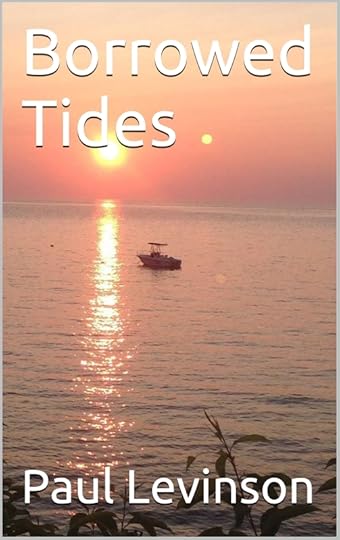
1st starship to Alpha Centauri ... had only enough fuel to get there
Paul Levinson's books ... Paul Levinson's music
Published on December 07, 2017 20:57
ABC News Wrong to Suspend Brian Ross
It's been a hectic week, otherwise I would have responded sooner to ABC News' suspension of Brian Ross for four weeks without pay, after he erroneously reported that Michael Flynn had been directed by candidate Donald Trump to make contact with the Russians.
The report was erroneous - not sufficiently investigated or vetted by Ross - but his suspension is an even worse affront to professional, truthful journalism.
As I point out and detail in Fake News in Real Context, reporters and news media have always made errors - unsurprising, given that reporters are human. That's why there has long been an "errata" note at the bottom of many front pages of The New York Times. What make fake news fake is not that it is in error, but that is deliberately designed to be that way - intended to deceive.
Trump and his minions, who first became purveyors of fake news in the 2016 election - and fake news itself has always been with us, see the "Blood Libel" in medieval Europe - cleverly sought to turn this charge on its head and smear truthful, honest reporting as fake news. In Trump-speak, fake news is any report that Trump finds unwelcome.
Understandably, legitimate media are especially sensitive to the need for their reporting to be truthful. But suspending an excellent reporter for making an error is playing right into Trump's hands, by removing from the field, for whatever the period of time, an honest warrior in the fight for truth, which is in turn a fight for democracy.
To ABC News and all news media: Admit your errors, sure. By all means apologize for them. The same for your reporters. But don't hold human beings, including journalists, to impossible standards of perfection. You don't need to prove to Trump that you're not fake news. Everyone (including him) know that you're real. We need human journalists, not angels (who are not readily available), to counter Trump's assault on reason.
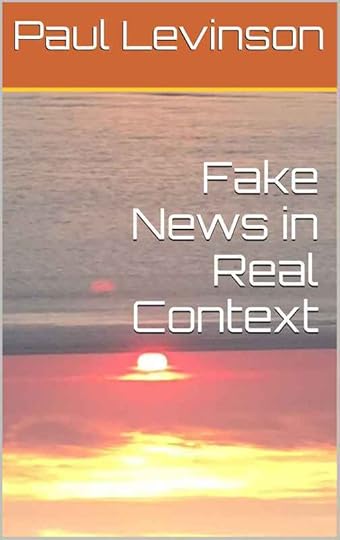 Paul Levinson's books ... Paul Levinson's music
Paul Levinson's books ... Paul Levinson's music
The report was erroneous - not sufficiently investigated or vetted by Ross - but his suspension is an even worse affront to professional, truthful journalism.
As I point out and detail in Fake News in Real Context, reporters and news media have always made errors - unsurprising, given that reporters are human. That's why there has long been an "errata" note at the bottom of many front pages of The New York Times. What make fake news fake is not that it is in error, but that is deliberately designed to be that way - intended to deceive.
Trump and his minions, who first became purveyors of fake news in the 2016 election - and fake news itself has always been with us, see the "Blood Libel" in medieval Europe - cleverly sought to turn this charge on its head and smear truthful, honest reporting as fake news. In Trump-speak, fake news is any report that Trump finds unwelcome.
Understandably, legitimate media are especially sensitive to the need for their reporting to be truthful. But suspending an excellent reporter for making an error is playing right into Trump's hands, by removing from the field, for whatever the period of time, an honest warrior in the fight for truth, which is in turn a fight for democracy.
To ABC News and all news media: Admit your errors, sure. By all means apologize for them. The same for your reporters. But don't hold human beings, including journalists, to impossible standards of perfection. You don't need to prove to Trump that you're not fake news. Everyone (including him) know that you're real. We need human journalists, not angels (who are not readily available), to counter Trump's assault on reason.
 Paul Levinson's books ... Paul Levinson's music
Paul Levinson's books ... Paul Levinson's music
Published on December 07, 2017 14:42
December 6, 2017
Vikings 5.3: Laughing Ivar
 The most searing image in Vikings 5.3 is Ivar laughing - in the face of death, in the form of the Saxons who have laid siege to York, now a Vikings stronghold. And we have our answer as to who will win this more evenly matched battle between Saxons and Vikings. It's close. But it's Vikings.
The most searing image in Vikings 5.3 is Ivar laughing - in the face of death, in the form of the Saxons who have laid siege to York, now a Vikings stronghold. And we have our answer as to who will win this more evenly matched battle between Saxons and Vikings. It's close. But it's Vikings.And Ivar has other reasons to laugh. The maiden he was going to sacrifice has stirred something in him, something he thought he didn't have. There should be some good times ahead for those two.
And Ivar finally has complete, undisputed control of his Vikings in Britain. Ubbe is sailing back home, and Hvitserk is staying with Ivar. Who is the truer Viking?
Well, they both are. Both are Ragnar's sons, and Ragnar did both. But Ivar, with his arational belief in his immortality, and his power to conquer all, is a little more like Ragnar. Ubbe's departure hasn't cost the Vikings much in England. Meaning: there should and will be some powerful battles ahead.
The best battles are always the most evenly matched - like the two attacks on Paris, and tonight's unsuccessful attempt by the Saxons to regain York. The slaughters of unarmed or poorly armed people may be true to history, but are not much fun to see.
Elsewhere, Floki has discovered the curative powers of hot springs in Iceland, and it was encouraging to see Bjorn so well along on his journey in the south.
And I'll be back here next week with more.
See also Vikings 5.1-2: Floki in Iceland
And see also Vikings 4.1: I'll Still Take Paris ... Vikings 4.2: Sacred Texts ...Vikings 4.4: Speaking the Language ... Vikings 4.5: Knives ... Vikings 4.8: Ships Up Cliff ... Vikings 4.10: "God Bless Paris" ... Vikings 4.11: Ragnar's Sons ... Vikings 4.12: Two Expeditions ... Vikings 4.13: Family ... Vikings 4.14: Penultimate Ragnar? ... Vikings 4.15: Close of an Era ... Vikings 1.16: Musselman ... Vikings 1.17: Ivar's Wheels ...Vikings 1.18: The Beginning of Revenge ... Vikings 4.19: On the Verge of History ... Vikings 4.20: Ends and Starts
And see also Vikings 3.1. Fighting and Farming ... Vikings 3.2: Leonard Nimoy ...Vikings 3.3: We'll Always Have Paris ... Vikings 3.4: They Call Me the Wanderer ... Vikings 3.5: Massacre ... Vikings 3.6: Athelstan and Floki ...Vikings 3.7: At the Gates ... Vikings 3.8: Battle for Paris ... Vikings 3.9: The Conquered ... Vikings Season 3 Finale: Normandy
And see also Vikings 2.1-2: Upping the Ante of Conquest ... Vikings 2.4: Wise King ... Vikings 2.5: Caught in the Middle ... Vikings 2.6: The Guardians ...Vikings 2.7: Volatile Mix ... Vikings 2.8: Great Post-Apocalyptic Narrative ... Vikings Season 2 Finale: Satisfying, Surprising, Superb
And see also Vikings ... Vikings 1.2: Lindisfarne ... Vikings 1.3: The Priest ... Vikings 1.4: Twist and Testudo ... Vikings 1.5: Freud and Family ... Vikings 1.7: Religion and Battle ... Vikings 1.8: Sacrifice
... Vikings Season 1 Finale: Below the Ash

historical science fiction - a little further back in time
Paul Levinson's books ... Paul Levinson's music
Published on December 06, 2017 22:30
Government Regulation of Social Media Would Be A 'Cure' Far Worse Than The Disease
In case you missed this, my article published 28 November 2017 in The Conversation ...
Government regulation of social media would be a 'cure' far worse than the disease
 NextNewMedia Paul Levinson,
Fordham University
NextNewMedia Paul Levinson,
Fordham University
In recent weeks, Congress has grilled Twitter, Facebook and Google about their role in allowing foreign interests to place ads and articles intended to divide the electorate and spread false information during the 2016 election.
Now a number of people in and out of government are calling for federal regulation of social media.
Lay down some rules, the thinking goes, and we would be able to prevent the infestation of bots and fake news from our news feeds and ads. Democracy would be saved – or, at least, foreign interference in our elections kept in check.
However, as someone who has studied and taught the First Amendment for decades, I would argue that if such regulations were enacted, the main victims would be not the purveyors of fake news, but our freedom of expression. In my view, the result would do far more damage to our democracy than any foreign misinformation campaign ever could.
Free speech being attacked from all sides
The First Amendment is under a lot of duress.
Arguably, it’s been that way since the Supreme Court’s “clear and present danger” decision in 1919, which spelled out when limits on free speech could be lawful. It not only held that the government had an obligation to stop someone from “falsely shouting fire in a theater,” but also opened the gates to all manner of government violations of the First Amendment injunction that “Congress shall make no law…abridging the freedom of speech, or of the press.”
These range from the FCC’s “Fairness Doctrine,” which was upheld by the Supreme Court, that required broadcasters to present controversial issues in a balanced way (in the FCC’s view), to the FCC’s warning to radio broadcasters in 1971 not to play songs that glorified drug use, which actually had the effect of limiting the airplay of songs that critiqued drug culture.
Indeed, with the exception of Supreme Court decisions in the Pentagon Papers case in 1971 and the Communications Decency Act in 1997, the American government has systematically increased its control of media.
The situation has gotten much worse over the past year. President Trump has tweeted about withholding the licenses of NBC affiliates and lashed out at other media not to his liking.
Although Trump’s bluster about limiting and punishing media may be easy enough to deride, the fact that he is in the White House – and has the ability to appoint FCC commissioners – means his threats must be taken seriously.
Meanwhile, a theory of philosopher Karl Popper – the “paradox of tolerance” – is being widely cited as a justification for outlawing hate speech, notwithstanding the First Amendment. From his 1945 book “The Open Society and its Enemies,” it says that tolerance defeats itself when it permits intolerant speech.
I studied Popper extensively while researching my first book, an anthology of essays about Popper’s work. There are many aspects of Popper’s philosophy to admire, but I don’t believe the “paradox of tolerance” is among them.
To ban hate speech could turn our tolerant, democratic society into precisely the kind of state that hate speech is calling for: It could open up an opportunity for all sorts of speech to be dubbed “hate speech.”
A slippery slope
When regulating fake news on social media sites, there’s the danger of the same sort of phenomenon taking place. And it’s exactly why the well-meaning hue-and-cry that the government needs to intervene and forbid social media sites from disseminating fake news or allowing accounts that are actually bots is so dangerous.
Fake news is nothing new. Centuries ago, anti-Semitic publications spread rumors that Jews murdered Christian children and drank their blood on holidays.
Over the past two years, social media have increased the amplitude and reach of fake news. But there’s also been the ascension of a political figure – Trump – who has turned the tables by labeling any unwelcome news as “fake.”
 Facebook ads linked to a Russian effort to disrupt the American political process are displayed as representatives from Google, Facebook and Twitter testify before the House Intelligence Committee on Nov. 1. Manuel Balce Ceneta/AP Photo
Facebook ads linked to a Russian effort to disrupt the American political process are displayed as representatives from Google, Facebook and Twitter testify before the House Intelligence Committee on Nov. 1. Manuel Balce Ceneta/AP Photo
The latter should be more than enough reason to reject calls for government censorship of fake news. After all, who’s to say a government that determines what’s “fake” won’t simply follow Trump’s lead, and suppress critical and truthful content under the guise that it’s fake?
Instead, social media networks could develop and implement algorithms for identifying and removing fake news by marshaling the same engines that spread fake news in the first place. These algorithms would not be administered by the government; rather, Facebook and other social media would be responsible.
Twitter has already made considerable progress flagging and removing accounts that spread Islamic State propaganda. There’s no reason to think that the same process can’t be applied to Russian bots seeking to inflame political discord and therein damage America’s political system.
Such self-regulation is in the best interest of these media companies. It would increase the confidence of their users in what they encounter online. It would also have the added benefit of keeping government regulators at bay.
In the end, the ultimate antidote to fake news and bots is the rationality of the human mind.
As John Milton famously urged in his “Areopagitica,” if you let truth and falsity fight it out in the marketplace of ideas, human rationality will most likely choose the truth. Regulating what can enter that marketplace could impair or destroy this process, by inadvertently keeping truth from public awareness.
Rational thinking’s ability to identify fake news is more than a Miltonian ideal: It’s been demonstrated in a carefully conducted 2015 experiment. When given a small financial incentive, the subjects were able to identify fake news as fake, even if the fake news supported the political views of the subjects.
Indeed, rationality is deeply implicit in democracy itself. You can’t have the latter without the former.

The key in combating fake news and kindred attacks on our body politic is to give our rationality maximum access to all information, including the truth. And in my view, this means resisting any attempts by government to limit the information that reaches us.
Paul Levinson, Professor of Communication and Media Studies, Fordham University
This article was originally published on The Conversation. Read the original article. Paul Levinson's books ... Paul Levinson's music
Government regulation of social media would be a 'cure' far worse than the disease
 NextNewMedia Paul Levinson,
Fordham University
NextNewMedia Paul Levinson,
Fordham University
In recent weeks, Congress has grilled Twitter, Facebook and Google about their role in allowing foreign interests to place ads and articles intended to divide the electorate and spread false information during the 2016 election.
Now a number of people in and out of government are calling for federal regulation of social media.
Lay down some rules, the thinking goes, and we would be able to prevent the infestation of bots and fake news from our news feeds and ads. Democracy would be saved – or, at least, foreign interference in our elections kept in check.
However, as someone who has studied and taught the First Amendment for decades, I would argue that if such regulations were enacted, the main victims would be not the purveyors of fake news, but our freedom of expression. In my view, the result would do far more damage to our democracy than any foreign misinformation campaign ever could.
Free speech being attacked from all sides
The First Amendment is under a lot of duress.
Arguably, it’s been that way since the Supreme Court’s “clear and present danger” decision in 1919, which spelled out when limits on free speech could be lawful. It not only held that the government had an obligation to stop someone from “falsely shouting fire in a theater,” but also opened the gates to all manner of government violations of the First Amendment injunction that “Congress shall make no law…abridging the freedom of speech, or of the press.”
These range from the FCC’s “Fairness Doctrine,” which was upheld by the Supreme Court, that required broadcasters to present controversial issues in a balanced way (in the FCC’s view), to the FCC’s warning to radio broadcasters in 1971 not to play songs that glorified drug use, which actually had the effect of limiting the airplay of songs that critiqued drug culture.
Indeed, with the exception of Supreme Court decisions in the Pentagon Papers case in 1971 and the Communications Decency Act in 1997, the American government has systematically increased its control of media.
The situation has gotten much worse over the past year. President Trump has tweeted about withholding the licenses of NBC affiliates and lashed out at other media not to his liking.
Although Trump’s bluster about limiting and punishing media may be easy enough to deride, the fact that he is in the White House – and has the ability to appoint FCC commissioners – means his threats must be taken seriously.
Meanwhile, a theory of philosopher Karl Popper – the “paradox of tolerance” – is being widely cited as a justification for outlawing hate speech, notwithstanding the First Amendment. From his 1945 book “The Open Society and its Enemies,” it says that tolerance defeats itself when it permits intolerant speech.
I studied Popper extensively while researching my first book, an anthology of essays about Popper’s work. There are many aspects of Popper’s philosophy to admire, but I don’t believe the “paradox of tolerance” is among them.
To ban hate speech could turn our tolerant, democratic society into precisely the kind of state that hate speech is calling for: It could open up an opportunity for all sorts of speech to be dubbed “hate speech.”
A slippery slope
When regulating fake news on social media sites, there’s the danger of the same sort of phenomenon taking place. And it’s exactly why the well-meaning hue-and-cry that the government needs to intervene and forbid social media sites from disseminating fake news or allowing accounts that are actually bots is so dangerous.
Fake news is nothing new. Centuries ago, anti-Semitic publications spread rumors that Jews murdered Christian children and drank their blood on holidays.
Over the past two years, social media have increased the amplitude and reach of fake news. But there’s also been the ascension of a political figure – Trump – who has turned the tables by labeling any unwelcome news as “fake.”
 Facebook ads linked to a Russian effort to disrupt the American political process are displayed as representatives from Google, Facebook and Twitter testify before the House Intelligence Committee on Nov. 1. Manuel Balce Ceneta/AP Photo
Facebook ads linked to a Russian effort to disrupt the American political process are displayed as representatives from Google, Facebook and Twitter testify before the House Intelligence Committee on Nov. 1. Manuel Balce Ceneta/AP Photo The latter should be more than enough reason to reject calls for government censorship of fake news. After all, who’s to say a government that determines what’s “fake” won’t simply follow Trump’s lead, and suppress critical and truthful content under the guise that it’s fake?
Instead, social media networks could develop and implement algorithms for identifying and removing fake news by marshaling the same engines that spread fake news in the first place. These algorithms would not be administered by the government; rather, Facebook and other social media would be responsible.
Twitter has already made considerable progress flagging and removing accounts that spread Islamic State propaganda. There’s no reason to think that the same process can’t be applied to Russian bots seeking to inflame political discord and therein damage America’s political system.
Such self-regulation is in the best interest of these media companies. It would increase the confidence of their users in what they encounter online. It would also have the added benefit of keeping government regulators at bay.
In the end, the ultimate antidote to fake news and bots is the rationality of the human mind.
As John Milton famously urged in his “Areopagitica,” if you let truth and falsity fight it out in the marketplace of ideas, human rationality will most likely choose the truth. Regulating what can enter that marketplace could impair or destroy this process, by inadvertently keeping truth from public awareness.
Rational thinking’s ability to identify fake news is more than a Miltonian ideal: It’s been demonstrated in a carefully conducted 2015 experiment. When given a small financial incentive, the subjects were able to identify fake news as fake, even if the fake news supported the political views of the subjects.
Indeed, rationality is deeply implicit in democracy itself. You can’t have the latter without the former.

The key in combating fake news and kindred attacks on our body politic is to give our rationality maximum access to all information, including the truth. And in my view, this means resisting any attempts by government to limit the information that reaches us.
Paul Levinson, Professor of Communication and Media Studies, Fordham University
This article was originally published on The Conversation. Read the original article. Paul Levinson's books ... Paul Levinson's music
Published on December 06, 2017 16:37
December 4, 2017
The Girlfriend Experience 2.9-10: The End of Illusions
 A doubly-powerful double episode of The Girlfriend Experience last night - 2.9-2.10 - with both Erica & Anna and Bria's separate stories delivering game-changing punches.
A doubly-powerful double episode of The Girlfriend Experience last night - 2.9-2.10 - with both Erica & Anna and Bria's separate stories delivering game-changing punches.Anna's decision last week to have a baby with Erica - by getting impregnated by a client - predictably leads Erica to end their relationship. But she does it in what we've now come to recognize as Erica's predictably ice-cold sadistic, shattering way. She leaves Anna waiting in the office. This was Anna's fault. But Erica could have come out and talked to her, rather than calling in security. And then, when Anna comes to Erica's apartment, Erica taunts Anna by kissing her, only to set up the revelation that Erica's former girlfriend is now on hand. Well, she's clearly no longer former. But Anna is stronger than Erica thinks, and I have feeling she'll have the last word on this (at least, I hope so).
Meanwhile, in Arizona or whatever part of the Southwest Bria is in, things are heating up, too, Bria confides in Paul. Maybe I was wrong about him. Maybe he's not out to kill Bria. Maybe he's just an a-hole. In any case, he deserves what Bria brings to him - a rifle with which she shoots up his car.
Also of significance is Ian, and the lack of his much vaunted protection. The way he lets Bria and her "daughter" go off the grid is ridiculous - unless he's a double agent - nah, that doesn't make sense - but there's something about him that doesn't seem quite right, either. That's what I've been saying about Paul, and last night we saw that he's been playing some kind of peculiar game, too. (Did he tell Bria that he was married? I can't recall, but I don't think so.)
Pretense is of course what The Girlfriend Experience has always been about. But it's reaching new levels in this split-personality season.
See also The Girlfriend Experience 2.1-2: Two for One ... The Girlfriend Experience 2.3-4: Hard to Come By ... The Girlfriend Experience 2.5-6: In and Out ... The Girlfriend Experience 2.7-8: Sundry Seductions
And see also The Girlfriend Experience: Eminently Worth It (my review of Season 1)
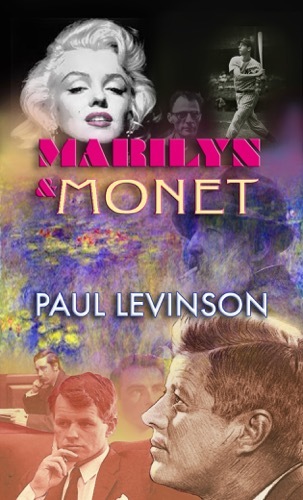
It all started in the hot summer of 1960, when Marilyn Monroe walked off the set of The Misfits and began to hear a haunting song in her head, "Goodbye Norma Jean" ... Paul Levinson's books ... Paul Levinson's music
Published on December 04, 2017 19:56
Dark: All the Time Travel Bases

Well, Dark on Netflix - which I binge-watched (all ten episodes over the past few days) - certainly covers all the bases, i.e., chestnut paradoxes, of time travel, including -
1. A grandson goes to the past to rescue a lost boy, whom everyone thinks has been kidnapped or worse, but the grandson realizes has been taken to or slipped into the past. But the grandson learns that the lost boy is really his father, who stayed in the past and became his father. And he's told (by someone more versed in time travel) not to rescue the lost boy, because that would result in the grandson ceasing to exist. And, just for good measure, the father of the lost boy, also (of course) the grandson's father, is running around in the past trying to find/save his lost son, too.
The present in Dark, by the way, is 2019. The past is 1986. And there's also some action in 1953. All three are tied together by 33-year luni-solar cycles (Google it). The three characters, in case you'd like to know their names, are grandson Jonas, kidnapped boy-father (of Jonas) Mikkel, grandfather-father Uhlrich of lost boy (Mikkel).
So, for starters, that's a pretty nifty presentation of the grandfather paradox - or, better, an attempt to avert it.
2. Uhlrich thinks he knows who kidnapped or killed Mikkel (he doesn't know Mikkel lived in 1983 and grew up), and tries to kill the kidnapper/killer. It's a harrowing scene, but a powerful rendition of what would you do if you could travel back in time and kill Hitler as a boy? (And, by the way, Dark is a German series with English subtitles).
3. And just for good measure, before the ten episodes are finished, Jonas has a crucial conversation with his older self.
And there are lots of other well rendered time travel gambits, with knowledge from the future influencing events in the past, to the point of bringing that future into being. Dark has been compared to Stranger Things. But other than lots of scenes of boys on bicycles, the two have little in common. Instead, Dark looks to me to be up there as one of the finest time-travel series on television.

It all started in the hot summer of 1960, when Marilyn Monroe walked off the set of The Misfits and began to hear a haunting song in her head, "Goodbye Norma Jean" ... Paul Levinson's books ... Paul Levinson's music
Published on December 04, 2017 00:31
December 3, 2017
Curb Your Enthusiasm 9.10: Outfit Tracker
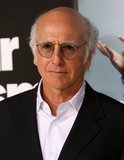 Well, it was a toss-up between "Outfit Tracker" and "No Apologies" as the title of my review of the Curb Your Enthusiasm Season 9 finale tonight, and I went with "Outfit" because ...
Well, it was a toss-up between "Outfit Tracker" and "No Apologies" as the title of my review of the Curb Your Enthusiasm Season 9 finale tonight, and I went with "Outfit" because ...Well, both motivated the standout Hamilton-like scene with Larry and Lin-Manuel dueling that set up most of the ending, but "outfit" also rhymes with one of the shtick that also showed up at the wedding, and also has to do with a kind of outfit, literally, so I went with that.
Larry and Curb haven't lost a thing in this long-awaited return season, and in some ways have gotten better with age. That's because the essence of the show - Larry's insistence on what he sees as proper conduct - as in commensurate apologies in tonight's show - are a fundamental part of life that no one else, certainly no other comedians, ply and develop as well as Larry. And we need those eternal verities of just behavior and calling parties out when it's not forthcoming and making a big, often hilarious joke out of it, more than ever in these our troubled times.
Speaking of which, was there any mention of Trump in season 9? I can't recall - and I'm too lazy to read my earlier reviews. But the fact that I can't recall shows that Trump played a negligible if any role in this season, and that's disappointing.
I mean, aren't we as consumers of comedy by someone as enlightened as Larry David entitled to see Trump skewered in some way?
Only kidding - I was just playing Larry in that disappointment. Frankly, I'm glad there was no memorable mention of Trump in this come-back season of Curb, because we get so much of him everyplace else.
Anyway, I hope there is another season, somewhere down the line, but in a way I'm glad this one's over, because as I said in my first review, I think there's something about reviewing comedies that's anti-comedic (which is why I don't usually if ever review comedies), and I'm pretty sure this very review proves it.
But see you back here with a review of another Curb, whenever that may be.
See also: Curb Your Enthusiasm 9.1: Hilarious! ... Curb Your Enthusiasm 9.2: Wife Swapping ... Curb Your Enthusiasm 9.3: Benefits ... Curb Your Enthusiasm 9.4: "Hold You in his Armchair" ... Curb Your Enthusiasm 9.5: Schmata At Large ... Curb Your Enthusiasm 9.8: The Unexpected Advocate ... Curb Your Enthusiasm 1.9: Salmon Discretion

It started in the hot summer of 1960, when Marilyn Monroe walked off the set of The Misfits and began Paul Levinson's books ... Paul Levinson's music
Published on December 03, 2017 20:48
Outlander 3.12: Geillis and Benjamin Button
 A superb Outlander 3.11 tonight, which features the return of time traveler Geillis, on that magical island of Jamaica, magical because, as Jamie notes, so many people from the Outlander story have congregated there - perhaps, as Jamie also muses, because Claire is there and she had come through the stones.
A superb Outlander 3.11 tonight, which features the return of time traveler Geillis, on that magical island of Jamaica, magical because, as Jamie notes, so many people from the Outlander story have congregated there - perhaps, as Jamie also muses, because Claire is there and she had come through the stones.But not only Claire but Geillis. And in one of the great little slip-ups which give glimpses of the future, Geillis tries to make sense of the 200-year old baby fortune, and brings up Benjamin Button. Of course, F. Scott Fitzgerald's story wasn't published until 1922, or well after slavery had ended in both the British Empire and America, as Claire earlier comments.
Not that Claire was present for Geillis's Button utterance, but it's fun and instructive to see how each woman from the future uses that knowledge to succeed in the past. Claire has a high moral code, unlike Geillis, who is just the opposite. Claire frees the slave she saved at the auction, in contrast to Geillis, who beds and then kills them.
I have a feeling we'll be seeing the freed slave again, if not this season then in some season subsequent, because he's too good a character to let walk off into the tropical forest, never to be in the action again. We'll see Jamie's nephew Ian, for sure, since Jamie and Claire are determined to save him.
Jamie, though, will first have to break lose from the red coats, and, I've got to say, I share Claire's fury at that young captain and his misplaced sense of duty. I'd be more than happy to see Geillis bed and then kill him.
Well, next week's the season finale, and this second half of the season, since Claire returned to Jaime, has been just outstanding.
See also Outlander Season 3 Debut: A Tale of Two Times and Places ...Outlander 3.2: Whole Lot of Loving, But ... Outlander 3.3: Free and Sad ... Outlander 3.4: Love Me Tender and Dylan ... Outlander 3.5: The 1960s and the Past ... Outlander 3.6: Reunion ... Outlander 3.7: The Other Wife ... Outlander 3.8: Pirates! ... Outlander 3.9: The Seas ...Outlander 3.10: Typhoid Story ... Outlander 3.11: Claire Crusoe
And see also Outlander 2.1: Split Hour ... Outlander 2.2: The King and the Forest ... Outlander 2.3: Mother and Dr. Dog ... Outlander 2.5: The Unappreciated Paradox ... Outlander 2.6: The Duel and the Offspring ...Outlander 2.7: Further into the Future ... Outlander 2.8: The Conversation ... Outlander 2.9: Flashbacks of the Future ... Outlander 2.10: One True Prediction and Counting ... Outlander 2.11: London Not Falling ... Outlander 2.12: Stubborn Fate and Scotland On and Off Screen ... Outlander Season 2 Finale: Decades
And see also Outlander 1.1-3: The Hope of Time Travel ... Outlander 1.6: Outstanding ... Outlander 1.7: Tender Intertemporal Polygamy ...Outlander 1.8: The Other Side ... Outlander 1.9: Spanking Good ... Outlander 1.10: A Glimmer of Paradox ... Outlander 1.11: Vaccination and Time Travel ... Outlander 1.12: Black Jack's Progeny ...Outlander 1.13: Mother's Day ... Outlander 1.14: All That Jazz ... Outlander Season 1 Finale: Let's Change History

It all started in the hot summer of 1960, when Marilyn Monroe walked off the set of The Misfits and began to hear a haunting song in her head, "Goodbye Norma Jean" ... Paul Levinson's books ... Paul Levinson's music
Published on December 03, 2017 18:17
November 30, 2017
The Orville 1.11: Eating Yaphit
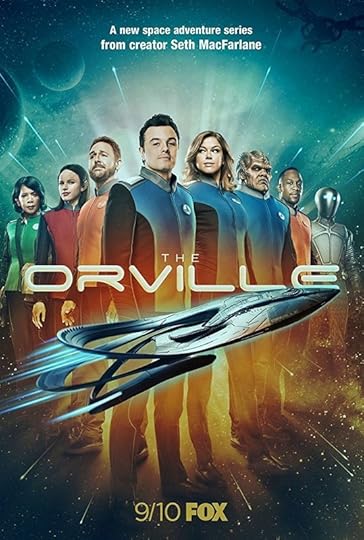
That might have worked as a title for tonight's excellent episode 1.11 of The Orville tonight - "Eating Yaphit" - but there were lots of other contenders, in an hour brimming with literary references, including
Abbott's 1884 Flatland, a little novel about a literally two-dimensional world - hey, I have a three-dimensional copy of the book, right on my shelfJane Austin, which Ed asks Kelly if they're living in (one of her novels, that is), when Kelly calls Ed a "prideful ass"Dr. Who's phone booth (aka police box), and its more room on the inside than it actually has on the outsideAnd the story was pretty good, too, drawing on both Flatland and Dr. Who with "The Orville" being sucked into and struggling to get out a swath of two-dimensional space, and the strange effects it has on living things. John also plays a big role, being promoted in the end to Chief Engineer, because Newton is retiring.
That in itself is a significant nod to the fine line The Orville has been flying between Star Trek: TOS and Star Trek: TNG. On the TNG side, before tonight, there was the Data-like Isaac and the Klingon-like Bortus on the bridge, and everything else TOS. But now we have the portly, Anglo Newton being replaced by the African-American John - or, in Star Trek terms, Scott of TOS giving way to Geordie of TBG.
Next week's the season finale, and my only regret is having to wait a light year to see more.
See also The Orville 1.1-1.5: Star Trek's Back ... The Orville 1.6-9: Masterful ... The Orville 1.10: Bring in the Clowns

1st starship to Alpha Centauri ... had only enough fuel to get there
Paul Levinson's books ... Paul Levinson's music
Published on November 30, 2017 20:26
Levinson at Large
At present, I'll be automatically porting over blog posts from my main blog, Paul Levinson's Infinite Regress. These consist of literate (I hope) reviews of mostly television, with some reviews of mov
At present, I'll be automatically porting over blog posts from my main blog, Paul Levinson's Infinite Regress. These consist of literate (I hope) reviews of mostly television, with some reviews of movies, books, music, and discussions of politics and world events mixed in. You'll also find links to my Light On Light Through podcast.
...more
- Paul Levinson's profile
- 342 followers



